 “In modern times there are opposing views about the practice of education. There is no general agreement about what the young should learn either in relation to virtue or in relation to the best life; nor is it clear whether their education ought to be directed more towards the intellect than towards the character of the soul…. And it is not certain whether training should be directed at things useful in life, or at those conducive to virtue, or at non-essentials…. And there is no agreement as to what in fact does tend towards virtue. Men do not all prize most highly the same virtue, so naturally they differ also about the proper training for it.”
“In modern times there are opposing views about the practice of education. There is no general agreement about what the young should learn either in relation to virtue or in relation to the best life; nor is it clear whether their education ought to be directed more towards the intellect than towards the character of the soul…. And it is not certain whether training should be directed at things useful in life, or at those conducive to virtue, or at non-essentials…. And there is no agreement as to what in fact does tend towards virtue. Men do not all prize most highly the same virtue, so naturally they differ also about the proper training for it.”
The statement above was written by the Greek philosopher and scientist Aristotle over 2300 years ago. But even though Aristotle’s “modern times” are today’s ancient times, there remains an ongoing debate about what students should be training toward in their formative years. Proponents of training ‘directed at things useful in life’ (i.e., vocational education) like California high school teacher Chris Peters say a radical overhaul could make U.S. secondary schools more effective. High schoolers should spend their first two years meeting basic standards, supporters say, then if they pass subject exams, they could choose between a college-prep track and a variety of community college vocational programs.
The question is a global one – recent reforms in Sweden led to the creation of a chain of “Knowledge Schools” that have been compared to IKEA and McDonald’s for their emphasis on standardization. These private schools that are free to the students achieve success by setting the expectation that students must be able to establish their own learning goals by the time they finish high school.
While the education experts may disagree, Aristotle recognized the difficulty we all face when trying to decide the path to personal virtue. Following the links in this post should assist with your journey.

I want to hear more